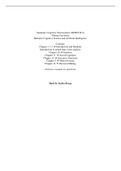Summary Cognitive Neuroscience (800803-B-6)
Tilburg University
Bachelor Cognitive Science and Artificial Intelligence
Contains:
Chapter 1 + 2 → Introduction and Methods
Introduction to neural time series analysis
Chapter 10 → Emotion
Chapter 11 → Social Cognition
Chapter 13 → Executive Functions
Chapter 5 → Motor Systems
Chapter 14 → Decision Making
Inclusive example mc questions
Made by Saskia Kriege
,LECTURE 1 – CHAPTER 1 AND CHATPER 2
What is Cognition?
‘the faculty of knowing’ in Latin
Refers to cognitive functions
Cognition is a process caried out by the mind
Set of processes (cognitive functions) that
- Perceive and process stimuli from outside and inside
- Store and retrieve information
- Decide upon and execute actions to achieve goals
Liberate and motor control
Cognitive functions:
- Reasoning
- Language
- Decision making
- Memory
- Perception
Philosophical Perspectives on Cognition
Plato, Aristotle → two schools of thinking
Plato: (innate)
- Nativist; all knowledge is available at birth, should only be ‘remembered’
Knowledge does not have to be invented
- Rationalist; logic, introspection and intuition lead to knowledge
- Nature
Aristotle: (experience)
- Empiricist: all knowledge stems from observation
- Data & hypothesizing can lead to new knowledge
- Nurture
Foundation of Modern Psychology
Psychologists were the first scientists to try and build models of the ‘mind’, outside of
philosophy
William James:
- Principles of Psychology (1890) big hit
- Very influential psychologist-philosopher
- Associationism;
Activation of part of memory activates associated elements
Can spread to another memory
Different concepts in the brain are related, thinking about one concept evokes another
,Herman Ebbinghaus (1850-1909):
- 1885: “memory, a contribution to Experiment Psychlogy”
- Used himself as research subject
- Nonsense syllable learning task (BRE, UIS, EWA)
Learn, delay, test (himself), relearn
Could tell you something how quantitatively memory works
‘free recall’
- Basic Principles:
Learning curve → asymptotic learning
Forgetting curve → exponential
Distributed vs massed practice → learning over time vs night before exam
Savings → relearning word list it becomes easier next time
Ivan Pavlov:
- Studied learning in animals (dogs)
- Classical Conditioning
Systematic co-presentation of bell and food would lead to certain association
After many pairings, just presenting the bell leads to dogs salivating
- Can be overwritten → extinction learning;
Learning a competing association
Refers to the gradual decrease in response to a conditioned stimulus that occurs when
the stimulus is presented without reinforcement
Edward Thorndike:
- Student William James
- Instrumental conditioning (= operant conditioning?)
Subject learns that certain action leads to positive/negative outcome
- Survival of the fittest
Certain actions get ‘selected’ others ‘die out’
- Law of Effect:
Strengthen behaviour leading to positive outcomes → behaviours immediately
followed by favourable consequences are more likely to occur again
Weaken behaviour leading to negative outcomes
There is a key distinction or difference between classical and operant conditioning6
: Classical conditioning associates involuntary behavior with a stimulus while operant
conditioning associates voluntary action with a consequence.
Early 205h Century: Behaviourism
, Behaviorism rejects the subjective work on mental functions as being outside the domain of
proper scientific inquiry. Due to not getting enough data on how the brain worked on the
inside, Behaviorism started in the US → experiments related to measurable behaviour.
- Lots of experiments on rats, pigeons
- Data gathered on learning, addiction, criminal rehabilitation
- Dismissing ‘invisible’ cognitive functions led to reduced scope of possible learning
grounds
They did stimulus presentation experiments to test a change in behaviour
→ operant conditioning → stimulus response learning
BUT they ignored cognitive functions, did experiments related to measurable behaviour
BF Skinner:
- Skinner Box: operant learning environment for rats
A Skinner box, also known as an operant conditioning chamber, is an enclosed
apparatus that contains a bar or key that an animal can press or manipulate in order
to obtain food or water as a type of reinforcement.
Reliable device, still in use
- Variable rewards → effect on rat behavior
- Beyond freedom and dignity (1971)
Consciousness and free will are illusions; everything is stimulus-response
Contrasting Behaviorist and Cognitive Approaches to Research
Behaviorism ignored cognitive functions, the rise of computational science and
information theory led to a rebirth of psychological research on cognitive functions.
- Computers led to a new way of thinking about mental processes
- This also led to the idea of AI
- People started thinking of the mind as a computer
a. Behaviorism
Assumes internal states and models that affect behavior
Tried to explain behaviour using only stimuli and responses, avoiding any reference to
the underlying mental processes. They did not necessarily deny the existence of
internal mental states, but instead argued that mental states could not be defined
independently of experimental operations (e.g. stimulus-response relationships)
STIMULUS → RESPONSE
b. Cognitivism (/Cognitive Scientists)
construct models related to psychological constructs (black arrows in picture),
manipulate attention/memory/empathy/etc, infer from responses (only thing you can
observe) how internal cognitive models are working.
Sought to explain the information processing that intervenes between stimuli and
behaviour. Those models assume that cognitive functions (the black arrows in scheme)
act upon stored information (coloured dots), transforming that information in the
service of adaptive behaviour
STIMULUS → MENTAL PROCESSES / BLACK BOX → RESPONSE
Criticisms of behaviourism (because it did not explain lots of real life behaviour) led to more
research involving humans
- lot of research into processes of cognition






